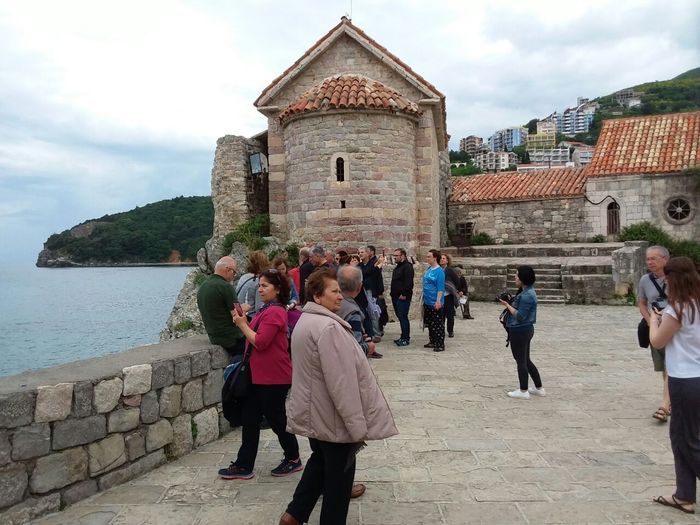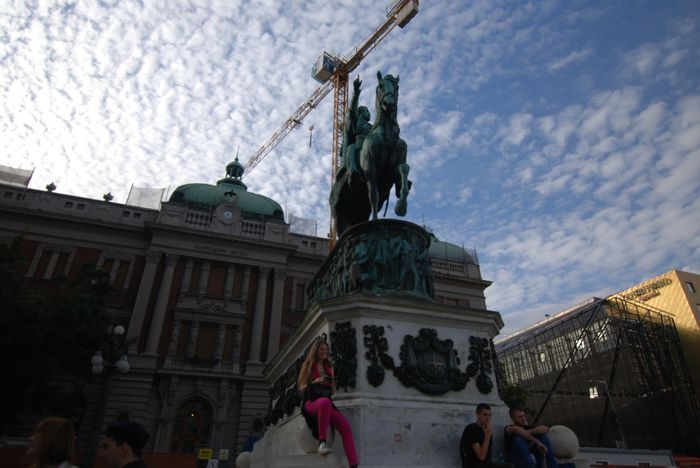Life among the wealthier classes of Constantinople and its Constantino neighborhood must have been, on the whole, very pie a city of pleasant. There were villas on the neighboring shores of the Bosphorus, on the Marmora towards San Stefano, and on the shore beyond Chalcedon, where one might escape from the great heat of summer and spend half the year in a country life, while the well-built palaces of the city were warm and comfortable in winter. The inhabitants appreciated these privileges and were proud of the Queen of Cities. The Byzantine noble, when compelled to leave it, longed to be back again. He loved the sacred city and the Marmora, where the zephyrs blew so softly, where the fountains were so pleasant, the baths so delicious, where the dolphins and other varieties of fish disported themselves on the surface of the waters, and where the nightingales and other singing birds made delightful music for those who flocked from all parts of the world to hear it. Constantinople was
Life among the wealthier classes of Constantinople and its Constantino neighborhood must have been, on the whole, very pie a city of pleasant. There were villas on the neighboring shores of the Bosphorus, on the Marmora towards San Stefano, and on the shore beyond Chalcedon, where one might escape from the great heat of summer and spend half the year in a country life, while the well-built palaces of the city were warm and comfortable in winter. The inhabitants appreciated these privileges and were proud of the Queen of Cities. The Byzantine noble, when compelled to leave it, longed to be back again. He loved the sacred city and the Marmora, where the zephyrs blew so softly, where the fountains were so pleasant, the baths so delicious, where the dolphins and other varieties of fish disported themselves on the surface of the waters, and where the nightingales and other singing birds made delightful music for those who flocked from all parts of the world to hear it. Constantinople was a city of business, but it was likewise a city of pleasure.
Every-thing that wealth could buy could be secured within its walls. As in our own days men who have acquired money in remote regions flock to Paris or London to take part in the luxurious life of these capitals, so the Cyprian, the islander, the trader from many a remote province or country, went to Constantinople as the place where he could make the best investment of his money in pleasure. But the inhabitant of what the Western writers then called Romania had a greater inducement to go to Constantinople than the inhabitant of Manchester or Marseilles to go to London and Paris. Property is, in modern times, as safe in these provincial cities as in the capitals of the countries in which they are situated, but property at Smyrna or elsewhere in Asia Minor was liable to attacks from the Turks; property in Mitylene or others of the islands of the Aegean and along the seaboard of the empire had to be continually protected from the pirates who were already infesting the neighboring seas.
As so secure as Constantinople
No city was regarded as so secure as Constantinople, and amid this security the wealthy man could find rarer silks, finer linen, and purer dyed purple, richer furs, dishes of greater delicacy, and wines of more rare and costly vintage than in the provinces. Precious stones and jewelry of every kind, including those ropes of pearls which are yet to be seen in daily wear at Damascus and other remote cities of Turkey, and to the display of which the inhabitants of Eastern Europe, like those of Asia, have always attached great importance, might be more safely worn, could be shown to more people Visit Bulgaria, and would be more highly appreciated than in the provincial towns.
The Crusaders regarded the luxurious dresses of the Bjrzantines as marks of effeminacy, just as a Turcoman horde clothed in sheepskin, marching upon Paris, would bo sure to regard the luxury of the capital as a sign that the manliness had departed from the nation. The Byzantines looked on the rough and ill-dressed Crusaders as rude and uncouth barbarians, unskilled in science, ignorant of art and literature, and entire strangers to the luxuries of civilization. The Crusaders are never weary of calling attention to the luxury and the wealth of the inhabitants of Constantinople, and Nicetas himself, the chief Byzantine historian of this period, tells several stories against his own countrymen of the fault found by the Crusaders with the effeminate character of this luxury. We may be sure, however, that the Byzantine point of view was far different. All the pleasures of nature and of art were his.
The climate was safe from the great heat
The climate was safe from the great heat of Smyrna or the cold of even a few miles farther north on the Black, that is, the rough, bleak, Sea. The Golden Horn, the Marmora, and the Bosphorus were bright during six or seven months of the year with gayly decked and graceful caiques, probably not much unlike their present representatives, except that they were higher in the stem and stern, and thus more graceful in form. Carefully trained oarsmen from the Greek islands or from the neighboring shores were to be had at a cheap rate, and each noble family had its own crews with gay distinctive badges. The ruins
now existing in the neighborhood of Constantinople show how largely the nobles led a villa life on the borders of the sea.
No city in the world is so largely gifted by nature with the requirements for a happy life. The bright sky, the blue, tideless waters of the Marmora, the vine-producing shores, the forests which even yet have not been so far destroyed as to drive away the nightingale, the flights of quail which pass the city twice every year and still fall occasionally in the streets of Constantinople, the never-failing supply of fish and other food, the presence of birds of beautiful plumage and song, all contributed to the joyous life of this city of pleasure.








